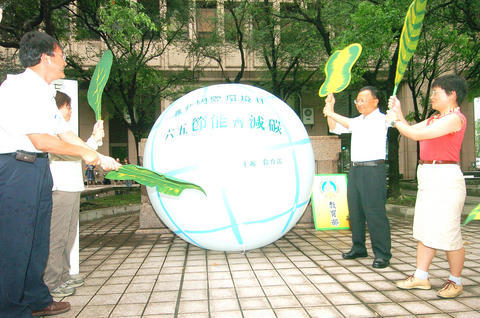The Ministry of Education is aiming for zero growth in school energy consumption this year amid the nation's soaring greenhouse gas emissions, Minister of Education Tu Cheng-sheng (杜正勝) said yesterday on the eve of World Environment Day.
A UN holiday promoting awareness of environmental issues, World Environment Day is typically an occasion used by government officials to address the nation's alarming carbon dioxide emission levels. In a press conference yesterday, Tu expressed concern for what he said was the yearly growth in energy consumption by schools nationwide, leading to further emissions of greenhouse gases.
He warned against cranking up air conditioners and called on students to wear cool, light attire as the summer approaches.

PHOTO: WANG MIN-WEI, TAIPEI TIMES
"If that which can be saved or cut down on isn't being saved or isn't being cut down on, you're being wasteful," Tu said.
The ministry plans to distribute energy saving and consumption monitoring technologies to more schools, it announced in a statement yesterday. Senior high schools and vocational schools nationwide, it said, were subsidized last year and in 2005 to install such technologies, leading to a "2 percent to 3 percent" reduction in consumption.
But the focus yesterday wasn't totally on Taiwan. Tu saved many of his remarks for China, which he slammed as "backward" for relying chiefly on coal for its energy needs. China's economic rise, he said, has led to an explosion in energy consumption there and, with that, "a daily worsening of pollution."
Environmental experts here, however, panned the government for "irresponsibility in its rampant increase of carbon dioxide emissions," saying that the nation's modest geographic size yet relatively high level of development make emissions levels inexcusable.
Unleashing more than 2.17 million tonnes of carbon dioxide into the atmosphere annually, or nearly 1 percent of the global total, Taiwan churns out more greenhouse gases than all but 21 nations, according to the Environmental Protection Administration.
"It's pretty bad," said Linda Arrigo of the Green Party Taiwan, a political party dedicated to protecting the environment, referring to the country's carbon dioxide emissions.
"Taiwan has doubled its carbon dioxide emissions since 1990, the year of the Kyoto Protocol, which aims to spur nations to gradually decrease such production," she said.
By more than doubling its greenhouse gas emissions from 1990 to 2005, according to official statistics, Taiwan's energy policies run counter to the spirit of the protocol, Arrigo said.
"It's outrageous," she said.
Speaking to the Taipei Times on condition of anonymity yesterday, a senior foreign trade official familiar with environmental issues here agreed, saying that "a negative de-coupling" in which the country's carbon dioxide emissions soar while its GDP drops, begs to be inverted.
But that's unlikely to happen in the near future because of the projected growth in carbon dioxide emissions, Arrigo said.
Steel and petrochemical plants scheduled to go online in Yunlin County, Arrigo said, would add approximately another 20 percent to the nation's greenhouse gas emissions.
"It's nice that schools want to decrease their energy consumption and carbon dioxide emission levels," she said. "But that's just a tiny fraction of the problem."

Chinese spouse and influencer Guan Guan’s (關關) residency permit has been revoked for repeatedly posting pro-China videos that threaten national security, the National Immigration Agency confirmed today. Guan Guan has said many controversial statements in her videos posted to Douyin (抖音), including “the red flag will soon be painted all over Taiwan” and “Taiwan is an inseparable part of China,” and expressing hope for expedited reunification. The agency last year received multiple reports alleging that Guan Guan had advocated for armed reunification. After verifying the reports, the agency last month issued a notice requiring her to appear and explain her actions. Guan

The Kaohsiung Tourism Bureau audited six hotels in an effort to prevent price gouging ahead of Korean band BTS’ concert tour in the city scheduled for Nov. 19, 21 and 22 this year. The bureau on Friday said that the audits — conducted in response to allegations of unfair pricing posted on social media — found no wrongdoing. These establishments included the local branches of Chateau de Chine, Hotel Nikko, My Humble House, and Grand Hai Lai, it said, adding that the Consumer Protection Commission would have penalized price gougers had the accusations been substantiated. The bureau said the Tourism Development Act

BACK TO WINTER: A strong continental cold air mass would move south on Tuesday next week, bringing colder temperatures to northern and central Taiwan A tropical depression east of the Philippines could soon be upgraded to be the first tropical storm of this year, the Central Weather Administration (CWA) said yesterday, adding that the next cold air mass is forecast to arrive on Monday next week. CWA forecaster Cheng Jie-ren (鄭傑仁) said the first tropical depression of this year is over waters east of the Philippines, about 1,867km southeast of Oluanpi (鵝鑾鼻), and could strengthen into Tropical Storm Nokaen by early today. The system is moving slowly from northwest to north, and is expected to remain east of the Philippines with little chance of affecting Taiwan,

GIVE AND TAKE: Blood demand continues to rise each year, while fewer young donors are available due to the nation’s falling birthrate, a doctor said Blood donors can redeem points earned from donations to obtain limited edition Formosan black bear travel mugs, the Kaohsiung Blood Center said yesterday, as it announced a goal of stocking 20,000 units of blood prior to the Lunar New Year. The last month of the lunar year is National Blood Donation Month, when local centers seek to stockpile blood for use during the Lunar New Year holiday. The blood demand in southern Taiwan — including Tainan and Kaohsiung, as well as Chiayi, Pingtung, Penghu and Taitung counties — is about 2,000 units per day, the center said. The donation campaign aims to boost